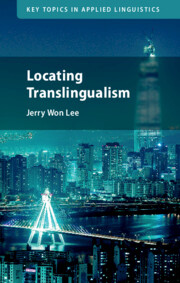Book contents
- Locating Translingualism
- Key Topics In Applied Linguistics
- Locating Translingualism
- Copyright page
- Dedication
- Contents
- Figures
- Acknowledgments
- Notes on the Text
- Introduction
- 1 Translingualism and the Locations of Culture
- 2 Locating Global Korea
- 3 Encountering the Unfamiliar: Languaging Culture
- 4 Visible Nation: Scaling Culture
- 5 Semiotic Excess: Tracing Culture
- Conclusion: More Locations of Culture
- References
- Index
Introduction
Published online by Cambridge University Press: 31 March 2022
- Locating Translingualism
- Key Topics In Applied Linguistics
- Locating Translingualism
- Copyright page
- Dedication
- Contents
- Figures
- Acknowledgments
- Notes on the Text
- Introduction
- 1 Translingualism and the Locations of Culture
- 2 Locating Global Korea
- 3 Encountering the Unfamiliar: Languaging Culture
- 4 Visible Nation: Scaling Culture
- 5 Semiotic Excess: Tracing Culture
- Conclusion: More Locations of Culture
- References
- Index
Summary
This chapter considers the significance of viewing cultural entities not only directly but “obliquely” as well, especially as they are encountered in translingual contexts. In order to do so, it outlines the various theoretical advancements of translingualism with a particular emphasis on the importance of attending to spatial and temporal considerations within linguistic/semiotic landscape research. In addition, while translingualism has been presented as a linguistic theory critical to establishing and sustaining cosmopolitan relations across cultural difference, this chapter raises the question of what it means to conceive of another cultural entity as “different” if such differences are semiotically produced in ways that are tenuous if not arbitrary. The chapter thus asks readers to explore culture as it is produced and reproduced within contexts of semiotic precarity, when the presumed essence of an entity is unable to be taken for granted (whether by an “outsider” or even an “insider”) and therefore demands affirmation or reaffirmation via semiotic distinction (semiotic acts that distinguish it from another cultural entity).
Keywords
- Type
- Chapter
- Information
- Locating Translingualism , pp. 1 - 27Publisher: Cambridge University PressPrint publication year: 2022

